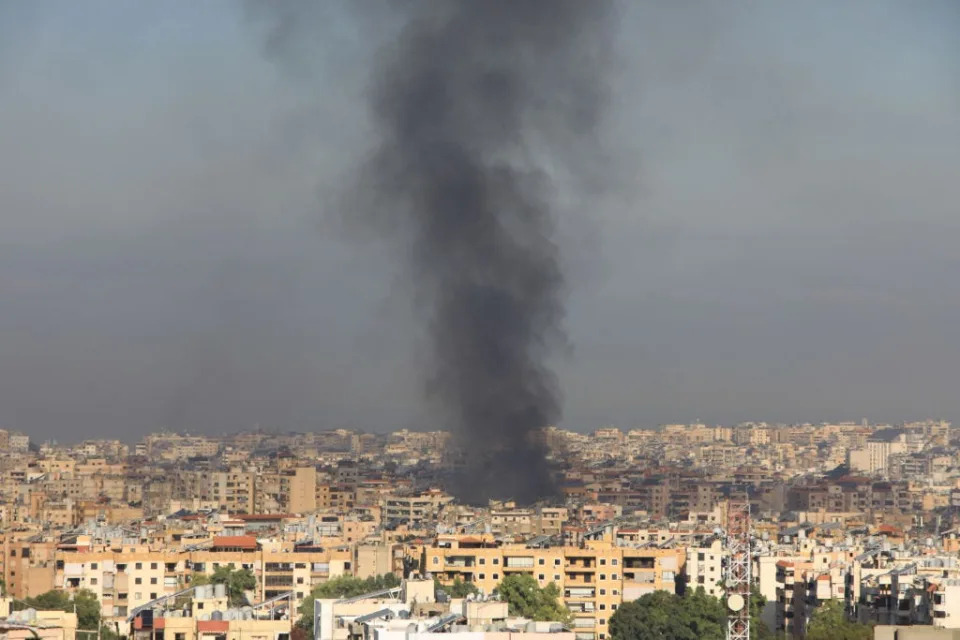-
Israel's Benjamin Netanyahu has launched a series of devastating attacks on Hezbollah.
-
He has rejected or ignored a series of attempts by the US to head off a wider conflict.
-
Biden has been criticized for trying to stop a wider war while still sending arms to Israel.
Prime Minister Benjamin Netanyahu is rapidly escalating Israel's campaign against its regional foes and trampling on US diplomatic efforts in the process.
In the latest sign he's ignoring US warnings, The Wall Street Journal reported that Israeli special-operations forces were carrying out raids into southern Lebanon as the possibility of a ground incursion this week loomed.
The raids were aimed at gathering intelligence and discovering Hezbollah's weaknesses, the Journal said.
Amir Avivi, a retired senior Israeli military official, told the publication that a ground invasion was imminent, a major escalation that Israeli officials have been threatening for months.
"The IDF has made a lot of preparations for a ground incursion," Avivi said. "Overall, this always includes special operations. This is part of the process."
The raids followed an unprecedented series of strikes from Israel. In the early hours of Monday, Israel struck central Beirut for the first time since 2006. It also confirmed it had killed Fateh Sherif Abu el-Amin, a Hamas leader, in Lebanon.
That came after the assassination of Hezbollah's top leader, Hassan Nasrallah, in a massive explosion in a suburb of Beirut on Friday, which dramatically raised the stakes of Israel's yearlong war against Iran-backed militias in the wake of the October 7 terrorist attacks.
Israel's stepped-up campaign against Hezbollah could be preparations for a ground invasion of Lebanon, and it risks triggering another confrontation with Iran.
US attempts to deter a wider war
President Joe Biden has long been seeking to prevent Israel's campaign against Hamas in Gaza from spiraling into a bigger war, which could drag in the US and regional powers.
However, some critics have claimed his approach has failed because US-supplied arms have allowed Netanyahu's embattled government to continue escalating and widening the war.
"Without US support, this war would not have been possible. It's actually the joint US-Israeli war," Gilbert Achcar, a professor of international relations at SOAS University of London, told France 24.
"It's not so much the Israelis who are treating him as an irrelevance," Jasmine El-Gamal, who was a Pentagon advisor during the Obama administration, told The Independent.
"It's that Biden is not actually trying seriously to effect any change," she said. "He's been complaining about Netanyahu for almost a year now, but in the meantime, the US continues to send arms and funds to Israel."
The US last week appeared to be on the brink of negotiating a cross-border cease-fire between Israel and Hezbollah — but just 24 hours later, Israel assassinated Nasrallah.
It was a strike that, the Journal said, shocked US officials. The publication, citing unnamed US officials, said Israel did not tip off its most important ally about the strike before it was carried out.
The White House described the killing as "a measure of justice for his many victims," though again urged against further escalation. Hezbollah was involved in the 1983 bombings of the US Embassy in Beirut and the US Marine Corps barracks in the city.

"We are shocked," one US official told CNN after Netanyahu rejected the cease-fire proposal before Israel launched its attacks.
It's the latest instance of the Israeli leader ignoring or rejecting Biden's attempts to restrain Israeli military action in Gaza and, more recently, Lebanon.
Netanyahu believes he is winning the war
A former British military chief said that may be because Netanyahu believed that he's winning the war in the Middle East.
Retired Gen. Richard Dannatt told Sky News on Sunday that Netanyahu thought he could "press on" with the conflict.
"A ground invasion of Lebanon is increasingly threatened," he told the outlet.
He said the US had been urging Israel to pull back but hadn't been doing enough to "effectively" stop Netanyahu.
"It is still supplying weapons and a lot of the stuff that Israel needs," Dannatt said.
"On the one hand, the US is calling for restraint, but on the other, they are not effectively stopping Netanyahu, and he believes that he is winning this war," he added.
Ignoring red lines
The US is by far the biggest supplier of arms to Israel.
The Council on Foreign Relations said in May that since the start of Israel's war with Hamas on October 7, the US had put in place legislation providing at least $12.5 billion in military aid to Israel.
Overall, since 2009, it has provided Israel with $3.4 billion in funding for missile defense, including $1.3 billion for the development of Israel's Iron Dome system, according to figures from the Bureau of Political-Military Affairs.
It's a big trading partner outside arms, too. US exports to Israel last year amounted to just over $14 billion, per figures from the United Nations Comtrade database on international trade.
Despite this, Netanyahu has ignored a series of red lines from Biden over how Israel conducts its campaign and rejected US pressure to reach a cease-fire deal with Hamas.
Sarah Leah Whitson, the executive director of Democracy for the Arab World Now, said in an article for Foreign Policy in September that Biden's reluctance to hold Israel to account was undermining the rules-based international order the president claims to champion.
Some say that as his time in office comes to an end, Biden is giving up. The White House has pushed back against these claims.
"No, he absolutely hasn't given up," Jake Sullivan, the White House's national security advisor, told CNN last week about reaching a deal to end the war in Gaza.
After the devastating blows Israel has dealt to its enemies in recent days, exposing the limits of their power and the reach of Israeli intelligence and weapons, Netanyahu likely believes that the impetus is with him.
But a widening conflict would likely not come to a conclusion quickly, US officials say.
US Secretary of State Antony Blinken said in the wake of last week's collapsed US peace effort that if Israel rejected diplomacy, it would result in "greater instability and insecurity, the ripples of which will be felt around the world."
"The choices that all parties make in coming days," Blinken said, "will determine which path this region is on with profound consequences for its people now and possibly for years to come."
AfriPrime App link: FREE to download...
https://www.amazon.com/Africircle-AfriPrime/dp/B0D2M3F2JT
Biden national security spokesman claims Netanyahu wants to avoid wider regional war
Joe Biden’s national security council spokesman claimed on Sunday that despite several rounds of Israeli bombings and attacks across Lebanon, Benjamin Netanyahu still supposedly opposes the escalation of the conflict against Hamas and Hezbollah into a wider regional war.
He also downplayed the reports of increasingly frayed ties between Washington and Jerusalem, which emerged in the wake of recent strikes including one that killed a senior Hezbollah commander, Hassan Nasrallah. The US president was reported to have been frustrated and caught off-guard in the wake of the strike, which he viewed as a humiliation of his top diplomat, Antony Blinken.
Stating that President Joe Biden and Prime Minister Benjamin Netanyahu have known each other for years, John Kirby said that the two “will never agree on everything” but do agree “on the big thing,” which he said was both the security of Israel as well as preventing further conflict around the Middle East.
But he evaded confirming or explaining reporting which indicated that relations had eroded to the point where US commanders were not notified of Israeli plans to kill Nasrallah until “planes were in the air.” He did indicate that the Biden administration was still not considering any efforts to limit the transfer of weaponry to Israel over concerns about how it was being used, stating that US support was “ironclad” when specifically asked about weapon transfers.
Kirby also remained firmly wedded to a theme the Biden administration’s messaging has followed for months: steady urging against retaliation from Iran, which once again risks being drawn into the conflict as a top revolutionary guard (IRGC) officer was also present and killed in the strike targeting Nasrallah, which hit a suburb of Beirut.
“We’ve seen the rhetoric coming out of Tehran. We’ll watch and see what they do,” Kirby said. He went on to indicate that the US would take steps to ensure the defense of US assets and/or Israel if an Iranian response threatened either one.
Hundreds of people — mostly civilians — are reported dead in the wake of the Israeli attacks on Beirut and the country’s south. Israeli officials maintain that the strikes are closely targeted to hit Hezbollah targets, but the pattern of civilian carnage which has been exemplified by the Israeli pounding of the Gaza Strip’s residential areas is quickly being mirrored across Lebanon. A number of Hezbollah commanders were confirmed dead among the strike targeting Nasrallah, which took place on Friday.
The secretary general of the United Nations warned just days prior that the war in Gaza was on the verge of engulfing the entire Middle East in seemingly perpetual bloodshed.
The US president, meanwhile, offered an almost robotic comment on the situation, one he has held to since October 7, while giving remarks at the UN General Assembly in New York: "Now is the time for the parties to finalise the terms [of a ceasefire deal]. Bring the hostages home, secure security for Israel, and free Gaza from Hamas’s grip. Ease the suffering in Gaza and end this war."
But any deal to end the conflict, or even pause it, seems further away than ever before. A recent Wall Street Journal report indicated that top US officials no longer believe one is possible to be reached within the next few months, and the continued targeting of Hezbollah commanders and forces by Israeli forces in Lebanon seems to point to the conflict widening, rather than being contained to Gaza.
Polling on the issue of Israel/Gaza in the US is somewhat scattered but generally shows support for Israel’s security and the US’s role in it; however, it also indicates that significant numbers of Americans support conditioning military aid to Israel on meeting international standards which prevent the targeting of civilians.
AfriPrime App link: FREE to download...


